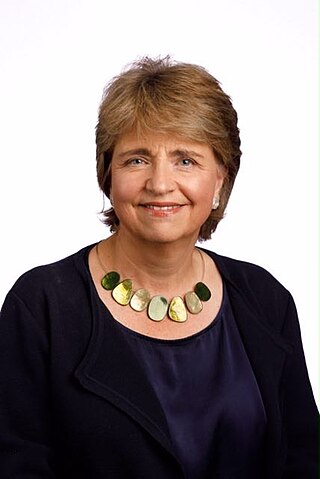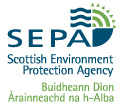
Wendy Alexander is a retired Scottish politician and the former Member of the Scottish Parliament (MSP) for Paisley North. She held various Scottish Government cabinet posts and was the Leader of the Labour Party in Scotland from 2007 to 2008. In 2010–2011 she convened the Scotland Bill Committee on financial powers of the Scottish Parliament.

In the United Kingdom, regional development agencies (RDAs) were nine non-departmental public bodies established for the purpose of development, primarily economic, of England's Government Office regions between 1998 and 2010. There was one RDA for each of the NUTS level 1 regions of England. Similar activities were carried out in Wales by the Welsh Government Department of Economy and Transport, in Northern Ireland by the Department of Enterprise, Trade and Investment and in Scotland by Scottish Enterprise and Highlands and Islands Enterprise.

The Scottish Environment Protection Agency is Scotland's environmental regulator and national flood forecasting, flood warning and strategic flood risk management authority. Its main role is to protect and improve Scotland's environment. SEPA does this by helping business and industry to understand their environmental responsibilities, enabling customers to comply with legislation and good practice and to realise the economic benefits of good environmental practice. One of the ways SEPA does this is through the NetRegs environmental guidance service. It protects communities by regulating activities that can cause harmful pollution and by monitoring the quality of Scotland's air, land and water. The regulations it implements also cover the storage, transport and disposal of radioactive materials.

NHS Education for Scotland (NES) is an education and training body and a national (special) health board within NHS Scotland.
Northern Ireland Council for Voluntary Action is the national infrastructure body for the voluntary and community sector in Northern Ireland. NICVA also hosts and manages several websites for Northern Ireland's voluntary and community sector online.
Communities Scotland was an executive agency of the Scottish Government from 2001 to 2008. The Agency was responsible for housing, homelessness, communities and regeneration throughout Scotland.
Energy Saving Trust is a British organization devoted to promoting energy efficiency, energy conservation, and the sustainable use of energy, thereby reducing carbon dioxide emissions and helping to prevent man-made climate change. It was founded in the United Kingdom as a government-sponsored initiative in 1992, following the global Earth Summit.

The Commission on Scottish Devolution, also referred to as the Calman Commission or the Scottish Parliament Commission or Review, was established by an opposition Labour Party motion passed by the Scottish Parliament on 6 December 2007, with the support of the Conservatives and Liberal Democrats. The governing Scottish National Party opposed the creation of the commission.
Hong Kong's medical infrastructure consists of a mixed medical economy, with 12 private hospitals and 43 public hospitals. Hong Kong has high standards of medical practice. It has contributed to the development of liver transplantation, being the first in the world to carry out an adult to adult live donor liver transplant in 1993. Both public and private hospitals in Hong Kong have partnered with the Australian Council on Healthcare Standards (ACHS) for international healthcare accreditation. There are also polyclinics that offer primary care services, including dentistry.
The Broadband Stakeholder Group is the UK government's advisory body on broadband. Created in 2001 by then Minister for E-Commerce and Competitiveness Stephen Timms, it provides a neutral forum for organisations across the converging broadband value-chain to discuss and resolve key policy, regulatory, and commercial issues, with the ultimate aim of helping to create a strong and competitive UK knowledge economy.
The Network of Buddhist Organisations is a British ecumenical body founded in 1993.

The Localism Act 2011 is an Act of Parliament that changes the powers of local government in England. The aim of the act is to facilitate the devolution of decision-making powers from central government control to individuals and communities. The measures affected by the Act include an increase in the number of elected mayors, referendums and the "Local authority’s general power of competence" which states "A local authority has power to do anything that individuals generally may do".
Healthcare Improvement Scotland (HIS) is the national healthcare improvement organisation for Scotland. It is a public body which is part of the Scottish National Health Service, created in April 2011.
International HL7 implementations is a collection of known implementations of the HL7 Interoperability standard. These do not necessarily refer to cross-border health information systems.
The Theatres Trust is the National Advisory Public Body for Theatres in the United Kingdom. It was founded in 1976 by an Act of Parliament to "promote the better protection of theatres for the benefit of the nation". The Trust has played a leading role in protecting theatre buildings for the duration of its history. It provides specialist advice to a variety of stakeholders throughout Britain to assist with the promotion and preservation of theatre buildings. The Trust's central aim is to "ensure that current and future generations have access to good quality theatres that reflect our cultural life and offer inspiring places to enjoy theatre". The Trust also holds historical and architectural records of many theatre buildings throughout the United Kingdom, which is made available online as part of a "Theatres Database".
The Stronger Futures policy is a multifaceted social policy of the Australian government concerning the Aboriginal population of the Northern Territory. It is underpinned by the Stronger Futures in the Northern Territory Act 2012, which ceases to have effect 10 years after its commencement on 29 June 2012.

The Marriage and Civil Partnership (Scotland) Act 2014 is an Act of the Scottish Parliament which allows same-sex couples to marry in Scotland since 16 December 2014.

The Scottish Council of Jewish Communities (SCoJeC) is the democratic representative body of all the Jewish communities of Scotland. The council was founded in 1999 in response to Scottish devolution, with the principal aim of providing the Jewish community of Scotland with a single voice in dealings with the Scottish Parliament and Government, other communities, and other statutory and official bodies.
The Pubs Code etc. Regulations 2016 were introduced by the UK Government as part of the Small Business Enterprise and Employment Act 2015. The code was passed on 14 June 2016 and implemented on 21 July 2016.

The Bridgend Farmhouse Community Project in Edinburgh, Scotland is a community-owned and community-run charitable organisation. The project restored an 18th-century farmhouse to provide a community meeting place, café, garden and workshops. The project runs classes, workshops and training courses in a variety of crafts and skills aimed at all age groups. It also provides facilities for performances, gatherings, talks, entertainment and small conferences. Given charitable status under the title Bridgend Inspiring Growth (BIG), the project was one of the first in Scotland to achieve community ownership in an urban setting. In 2018 it became the first organisation in Scotland to transfer from a Scottish Charitable Incorporated Organisation (SCIO) to a Community Benefit Society with charitable status.








